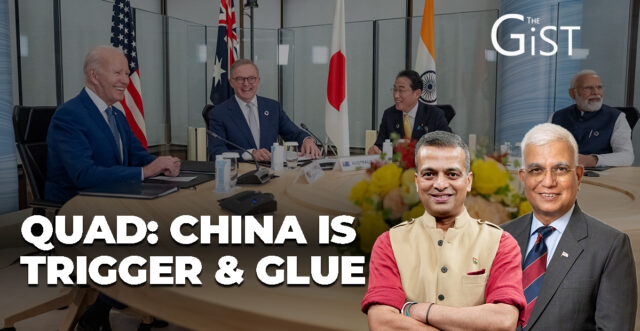Quad Leaders’ Summit In U.S.
Australia, India, Japan and the U.S. are expected to hold the Quad Leaders’ Summit in Wilmington, Delaware, the home city of U.S. President Joe Biden, on Sept. 21, reports say. This will be the last gathering of the current leaders. Biden and Japanese Prime Minister Fumio Kishida are outgoing heads of governments. Indian Prime Minister Narendra Modi and Australian Prime Minister Anthony Albanese will also be in the U.S. for the United Nations General Assembly Session. Rear Admiral Sudarshan Y. Shrikhande (Retd) is currently a Senior Research Fellow at the University of Wollongong’s Australian National Centre for Ocean Resources and Security (ANCORS). He’s also served as the Director of Naval Intelligence in the Indian Navy. In this conversation on ‘The Gist’, he speaks to StratNews Global Associate Editor Amitabh P. Revi on where the Quad stands currently and where it is heading.
Quad: China Is Trigger And Glue
“Each of the member nations, in its own, at different fora and different occasions has flagged concerns about China as an adversarial problem,” Admiral Shrikhande points out. Adding, “collectively now this is reflecting more and more in the communiques coming out of the Quad. And in fact, the measures that the Quad is taking. However, having said that, the Quad is far more than being about just China. Although China has been the trigger as well as the glue for the Quad to create many of the initiatives which seek to provide public goods, on a much larger canvas of the entire Indo-Pacific”.
No Need To Expand Quad
“We do not need more members in the Quad,” the Admiral opines. He cites examples of “the Indonesian President speaking favourably about the Quad. ASEAN is now speaking about the Quad and the Pacific Island nations are looking at the Quad as a benefit to them. They need not become members. Many organisations which have expanded in membership, actually can become unwieldy and their effectiveness can start reducing. So, for the moment, the Quad can literally remain just the Quad. It need not become inclusive in its membership because it is so inclusive in its agenda and in what it can provide to others”.
Admiral Shrikhande also discusses:
- The expected Quad Leaders’ Summit In U.S.
- Quad Joint Statements and their “robustness”.
- Joint Communiques becoming increasingly “specific”.
- Maritime, Space and Cyber commons.
- Free and Open Indo-Pacific(FOIP) as a deterrent against China.
- Maritime, Digital trade and security of undersea cables.
- India’s growth and need to shoulder greater responsibilities.
- Malabar naval exercises, formalising Quad and setting up a Secretariat.
- Quad as a “mirror of sorts of the Marshall Plan”.
- The Quad Security dialogue being ” of India’s biggest foreign policy steps”.
- And its reminiscence to the 1971 India-Soviet Union Treaty of Peace, Friendship and Cooperation.
The 'Eye' of the story not the 'I' of the story. That's Amitabh Pashupati Revi's credo from the beginning of his professional journey in 1995. From conflicts in the war zones of Afghanistan, Syria, and Iraq to nuances of international politics in the Maldives,Thailand, and South Sudan, Amitabh has reported from all the world's continents, except for Antarctica(so far). Though, he has documented the world's third pole, the Siachen Glacier!
Amitabh reports and produces documentaries on the two-front China-Pakistan threat to India. His ground reports from Arunachal Pradesh and Ladakh have received viewership in the hundreds of thousands. Amitabh has interviewed world leaders, top global analysts, and experts in India, Russia, the United States, and Australia as well. Along the way, he’s picked up the Russian language, the Ramnath Goenka Award for his reporting on the 'Islamic State' terrorist group in Iraq, the Khaled Alkhateb Award for his reporting from Palmyra, Syria, and the UN Dag Hammarskjöld Distinguished Journalist Fellowship. Last but not least, as a founder member of StratNews Global, Amitabh helps lead the reporting, editorial, production, and administration teams at StratNews Global, BharatShakti, and InterStellar on their journey ahead.





